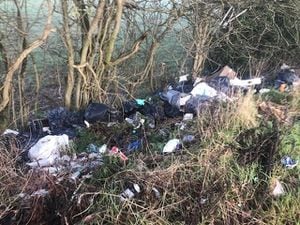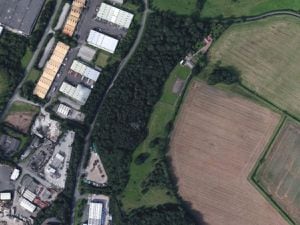'Genuinely quite disgusting': Shropshire fly-tippers slammed for dumping in countryside
Mattresses, metal bars and bottles of beer are among items "disgusting" fly tippers have been dumping in Shropshire's countryside and waterways.

Fresh figures show more than 6,300 incidences of fly tipping were recorded last year - an additional 2,000 on than the previous 12 months.
The increase has been attributed to people carrying out home improvements and DIY during coronavirus lockdowns. But the behaviour has been criticised by groups trying to look after the environment.
Zoey Rowe, from Wombourne Kayak Club, is regularly clearing litter away from the river and its banks. The group has found all sorts dumped, even a mattress.
She said: "It's just shocking. I've been on the rivers since the 1980s and it just gets dirtier and dirtier. It's genuinely quite disgusting. We find all sorts of items in the river.
"England has been somewhere we've all turned to during the lockdowns. It's been like a haven. So we don't need fly-tipping."
A Shropshire Council spokesman insisted perpetrators will be prosecuted where possible.
“One of the main reasons people flytipped more in 2020/21 compared to 2019/20 was the pandemic effect on behaviour change," he said.
"Coronavirus restrictions meant that many people were not travelling far from home, focusing more of their time on home improvements or clearouts; and with either reduced or limited access to the council’s household recycling centres – temporary closures during the first Lockdown period, and when reopened the public were faced with long queues."
In terms of the impacts, he said it was "detrimental to the environment, communities and neighbourhoods where people have fly tipped their waste. Increased cost for clearance and disposal. Increased pressure on council staff and service delivery teams.
"We would seek to prosecute perpetrators, where possible," he added.
Litter picker Rob Skinner branded dumping in Ironbridge last November an "environmental threat", and added: “I have to say that the level of fly tipping is on an industrial scale. Laybys are some of the worst places I have seen, with people leaving human waste and alcohol containers there routinely.”
Also in November, Shrewsbury man Jonathan Wells was fined for abandoning a waste site in Ludlow, leaving it to become a fly tipping hotspot. And in December 2020, more than 1,000 tyres were dumped at Bradford Estates, on the Shropshire/Staffordshire border on the A41.
“Fly-tipping is an unwelcome blight on our countryside and can represent far more than an inconvenience to victims of the crime,” said Rupert Wailes-Fairbairn, of rural insurance broker Lycetts.
“Incidents not only pose significant environmental and human health risks, but also a legal and financial burden for farmers and landowners.
“Although local authorities will usually pay the clean-up costs of clearing waste from public land, the responsibility for removing waste from private land falls squarely at the feet of the landowners. If they fail to do so, they can face prosecution.”
Clean-up bills per incident average around £1,000, according to the National Rural Crime Network, but large-scale incidents can cost upwards of £10,000.





